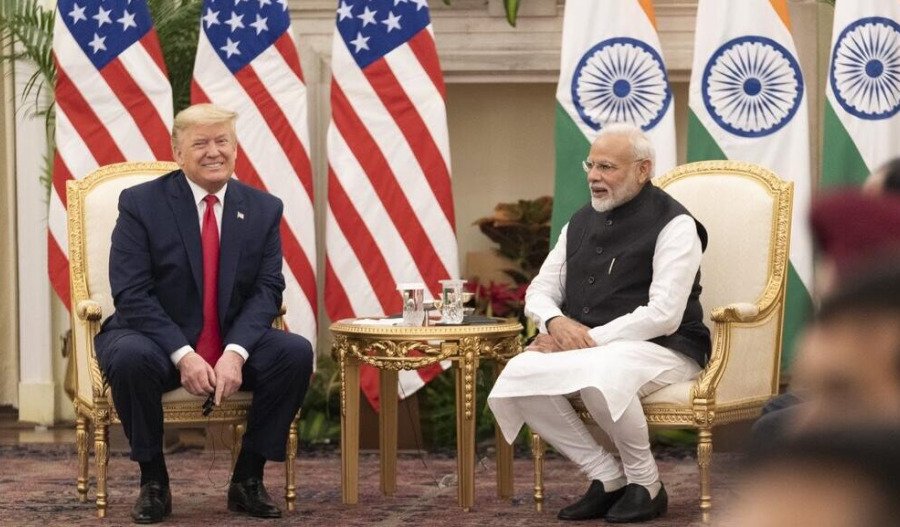India and Britain have finalised a historic free trade agreement, marking the UK’s most significant post-Brexit trade pact and India’s most ambitious deal to date.
The agreement, which took over three years to negotiate, is expected to boost bilateral trade by £25.5 billion (A$52.48 billion) annually by 2040.
It slashes tariffs on key UK exports, including whisky, cosmetics, medical devices, and automotive parts, while India secures greater access to textiles, marine products, and gems on the British market.
Investor confidence in the deal is high, with tariffs on whisky and gin halved from 150% to 75%, eventually dropping to 40% over a decade.
Automotive tariffs will fall from over 100% to 10% under a quota system, making British luxury cars more competitive in India’s growing market.
The agreement also streamlines business mobility, allowing Indian professionals, including chefs and musicians, to work in the UK under a structured visa framework.
The UK government estimates the deal will add £4.8 billion to the British economy annually, while Indian exporters benefit from 99% of their goods facing no import duty in the UK.
The pact also includes a double contribution convention, exempting Indian workers in Britain from social security payments for three years, a move expected to save Indian firms billions.
“We are now in a new era for trade and the economy. That means going further and faster to strengthen the UK’s economy,” British Prime Minister Keir Starmer said.
“Strengthening our alliances and reducing trade barriers with economies around the world is part of our plan for change to deliver a stronger and more secure economy here at home.”
Indian Prime Minister Narendra Modi said, “These landmark agreements will further deepen our comprehensive strategic partnership, and catalyse trade, investment, growth, job creation, and innovation in both our economies.”
As both nations seek to navigate shifting global trade dynamics, this agreement positions India and the UK as key players in the evolving economic landscape.
Key Highlights of the India-UK FTA:
- The FTA with the UK is a modern, comprehensive and landmark agreement which seeks to achieve deep economic integration along with trade liberalisation and tariff concessions.
- The FTA ensures comprehensive market access for goods, across all sectors, covering all of India’s export interests. India will gain from tariff elimination on about 99% of the tariff lines covering almost 100% of the trade value offering huge opportunities for increase in the bilateral trade between India and the UK.
- The FTA provides positive impact on manufacturing across labour and technology intensive sectors and opens up export opportunities for sectors such as textiles, marine products, leather, footwear, sports goods and toys, gems and jewellery and other important sectors such as engineering goods, auto parts and engines and organic chemicals. This will substantially improve Indian goods competitiveness in the UK vis-a-vis other countries.
- The FTA will have significant positive gains for employment in India.
- India will benefit from one of the most ambitious FTA commitment from the UK in Services such as IT/ITeS, financial services, professional services, other business services and educational services, opening up new opportunities and jobs.
- The FTA eases mobility for professionals including Contractual Service Suppliers; Business Visitors; Investors; Intra-Corporate Transferees; partners and dependent children of Intra-Corporate Transferees with right to work; and Independent Professionals like yoga instructors, musicians and chefs.
- Immense opportunities for talented and skilled Indian youth will open up in the UK which is a major global centre for digitally delivered services due to its strong financial and professional services sectors and advanced digital infrastructure.
- India has secured significant commitments on digitally delivered services for Indian service suppliers, specially in professional services such as architecture and engineering, computer related services and telecommunication services.
- The exemption for Indian workers who are temporarily in the UK and their employers from paying social security contributions in the UK for a period of three years under the Double Contribution Convention will lead to significant financial gains for the Indian service providers and enhance their competitiveness in the UK market that would create new job opportunities as well as benefit large number of Indians working in the UK.
- India has ensured that non-tariff barriers are suitably addressed to ensure free flow of goods and services and that they do not create unjustified restrictions to India’s exports.
- The FTA seeks to promote good regulatory practices and enhance transparency that are in sync with India’s own focus on domestic reforms to enhance the ease of doing business.
Related content



